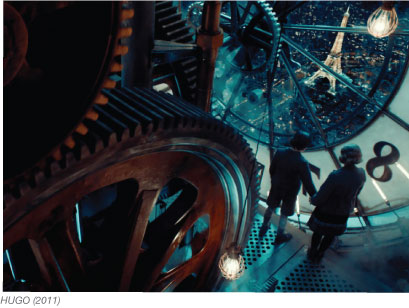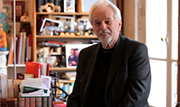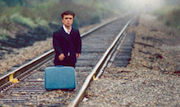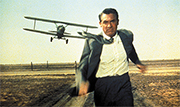
What's your favorite film? Is there a movie that changed your life? Send us an essay of 500 words, give or take, about that film you can't forget – classic or contemporary – and we'll consider it for publication in these pages. In addition to your short essay, send your name, occupation, hometown, phone number, jpeg headshot and e-mail address to editor@AFI.com. We reserve the right to edit for length and clarity.
READER REVIEW: HUGO
By Judy Seckler

Judy Seckler is a Los Angeles-based journalist, editor, and film lover. Her writing focuses on art, design,film and architecture.
 During the recent Academy Awards® telecast's 75th anniversary celebration of THE WIZARD OF OZ, actress Whoopi Goldberg reminded the public that for many years the film could only be seen once a year on network television. Readers of a certain age may agree that the anticipation and excitement of watching the film was one of the highlights of the kid year.
During the recent Academy Awards® telecast's 75th anniversary celebration of THE WIZARD OF OZ, actress Whoopi Goldberg reminded the public that for many years the film could only be seen once a year on network television. Readers of a certain age may agree that the anticipation and excitement of watching the film was one of the highlights of the kid year.
By bringing HUGO to the screen in 2011, director Martin Scorsese continues the tradition by capturing that same magic. Similar to OZ, the actors are perfectly cast, posed in sumptuous sets with an airtight plot that rumbles to an emotionally satisfying conclusion. Scorsese, whose filmography includes jewels as varied as RAGING BULL, TAXI DRIVER, THE COLOR OF MONEY, THE AVIATOR, and THE DEPARTED, may not ultimately be remembered for creating classic children's entertainment, but consider the following:
Beginning with the film's first frame, in which clock gears dissolve Saul Bass-style into an aerial view of the L'arc de Triomphe in Paris, France, the audience is introduced to an array of unforgettable visual imagery. The camera swoops through the train tracks on an indelible journey to the cavernous interior of a 1930s Parisian train station to become a key character in the picture. It is a place that roots the boy, Hugo, in his universe and is the source of his torturous emotional existence.
The clocks that are Hugo's reason for being provide the visual tapestry upon which the story unfolds. While the train station is too grounded in reality to compete with the splendor and fantasy of Oz, Victorian embellishments and an added Steampunk sensibility lift the station and its clocks out of its quotidian existence. Thrust into this vivid, pulsating world is an automaton, a complex robot toy, which remains Hugo's only physical connection to his biological father, and becomes his link to George Méliès, one of the fathers of modern cinema.
 According to the HUGO DVD, fabricators built eight automatons for filming. The prop, possessing the highest levels of detail, exists on its own as a piece of art sculpture. It is a stunning achievement that more than one or two could be built, let alone eight in a tight production schedule. Then, consider that the movie was shot in 3D format. Although not known for pushing film technology, Scorsese made the absolute right move, and is the best argument for watching HUGO on the big screen.
According to the HUGO DVD, fabricators built eight automatons for filming. The prop, possessing the highest levels of detail, exists on its own as a piece of art sculpture. It is a stunning achievement that more than one or two could be built, let alone eight in a tight production schedule. Then, consider that the movie was shot in 3D format. Although not known for pushing film technology, Scorsese made the absolute right move, and is the best argument for watching HUGO on the big screen.
If the boy Hugo's journey does not have the same urgency as Dorothy's in OZ, it is because the story's last act ventures beyond childhood concerns into the adult world. Scorsese, a well-documented film preservationist and historian, must have been delighted to be able to fill the screen with clips from Méliès' treasured body of work. How better to honor movie history even at the expense of the film's pacing.
HUGO may be a story about a boy, but it is so much more. There are emotionally satisfying messages about how people easily become broken when they lose their purpose. Other comments are directed at film lovers about movies as a “special place” and having “the power to capture dreams.” A heart stopper moment occurs near the film's end as the Station Inspector plucks Hugo off the train tracks after the boy has saved the automaton. Will Hugo be another one of the man's victims and end up in the orphanage or will his courage pay off? To witness Hugo trade his Dickensian childhood for a new, loving family is the ultimate prize.
Edit Here




